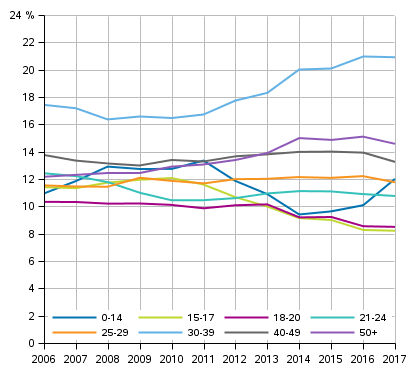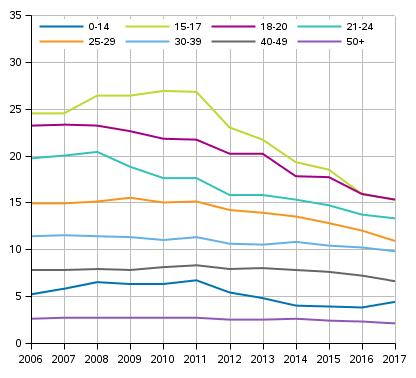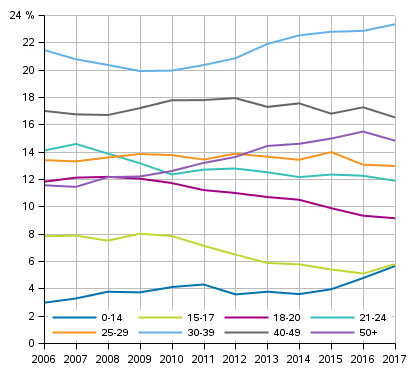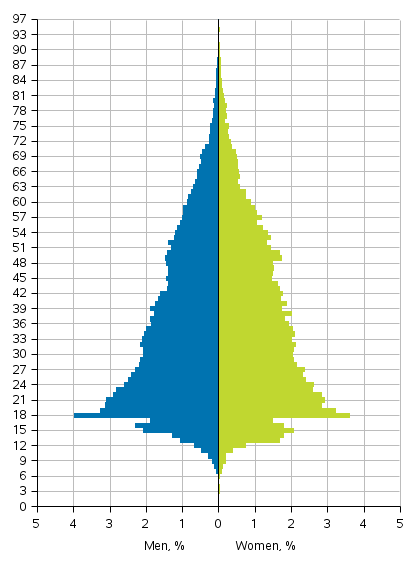Published: 8 May 2018
Share of young people suspected of offences against property declining
According to Statistics Finland's data, a total of 861,900 offences were recorded in 2017 by the police, customs and border guard in the whole country, which is 38,500 offences (4.7 per cent) more than one year before. In all, 669,900 persons were suspected of the 644,500 offences and infractions solved in 2017. The largest group of persons suspected of offences against property were those aged 30 to 39. The increase in the share of persons aged 50 or over is at least partially explained by the growth in the age group.
Share of persons suspected of solved offences against property by age group in 2006 to 2017, %

The share of young people suspected of solved offences against property has been declining in recent years. In 2017, the share of persons aged 15 to 17 suspected of offences against property was 8.2 per cent, having been 11.4 per cent in 2006. The development has also been similar for persons aged 18 to 20: in 2017, their share was 8.5 per cent and in 2006, it was 10.3 per cent. The share of persons aged 21 to 24 has also primarily been declining: in 2006, the share was 12.4 per cent and in 2017, only 10.8 per cent. On the other hand, the share of persons aged under 15 has been growing since 2014, even though it was decreasing prior to that. The number of suspects has decreased in all age groups compared to 2006. For some age groups more than for others, which in part explains the changes in the shares.
The shares have been calculated so that a person is a suspect only one time during the year. This means that multiple offences committed by some persons are not visible in the figures. The figures calculated in this manner differ from the figures presented in Table 6 of Section 2.2 in this publication, where the same person has been included as many times as he/she has been a suspect during the year.
The share of those aged 25 to 29 has primarily remained under 12 per cent. In 2006, the share was 11.5 per cent and in 2017, it was 11.8 per cent. No significant changes have taken place in the share of those aged 40 to 49 either. The share has been around 13.5 per cent even though there are 1,500 fewer suspects in this age group than in 2006. By contrast, the share of persons aged 50 or over among those suspected of offences against property has increased a little. Their share was 12.2 per cent in 2006 and 14.6 per cent in 2017.
The largest group of persons suspected of offences against property were those aged 30 to 39. Their share has increased from 17.4 to 20.9 per cent of suspects, even though their absolute number among suspects is nearly 600 lower. On the other hand, when this age group is proportioned per 1,000 population (lower figure) the group does not stand out. The drop in the share of those aged 15 to 17 and 18 to 20 witnessed in the upper figure is also visible in the lower figure (top two lines). This is at least partially explained by the age groups becoming smaller. During the review period, the age group 15 to 17 was at its biggest in 2007 when they numbered around 201,500 while in 2017 they numbered 175,900. The 18 to 20 age group has also decreased: in 2010 they numbered around 203,200 while in 2017 only 181,900. The age group of those aged under 15 has decreased over the review period from around 901,200 to some 890,400.
Persons suspected of solved offences against property, proportion per 1,000 population in the age group in 2006 to 2017

The development of the age structure of persons suspected of solved offences against life and health does not differ much from the development of the age structure of those suspected of offences against property. The clearest difference is that the shares of the youngest age groups (aged under 18) are smaller than the corresponding shares of these age groups in offences against property.
Share of persons suspected of solved offences against life and health by age group, %

Of those suspected of offences against the Penal Code, the biggest group was persons aged 18 both among men and women. The age structure of female suspects is very similar to that of male suspects. Persons aged under 15 do not have criminal responsibility but pre-trial investigations can be performed on offences they have committed.
Persons suspected of offences against the Penal Code according to the most aggravated offence in 2017, share by sex and age, %

More detailed data on offences reported in 2017 and persons suspected of solved offences and their backgrounds are available in the review published on 8 May 2018 and in the PX-Web database service . The database table describing reported domestic violence and intimate partner violence will be updated in connection with the release of 31 May 2018.
Source: Statistics on offences and coercive measures 2017, Offences reported. Statistics Finland
Inquiries: Kimmo Haapakangas 029 551 3252, rikos@stat.fi
Director in charge: Jari Tarkoma
Publication in pdf-format (775.7 kB)
- Reviews
- Tables
-
Tables in databases
Pick the data you need into tables, view the data as graphs, or download the data for your use.
Appendix tables
- Appendix table 1. Development of certain types of offences in 2013 - 2017 (8.5.2018)
- Appendix table 2. Persons suspected of offences living in Finland by nationality in 2014 - 2017, share per 1,000 population (8.5.2018)
- Appendix table 3. Reported objects of theft offences in 2013 to 2017 (8.5.2018)
- Appendix table 4. Persons suspected of offences and the entire population by income (euro) subject to state taxation in 2017, aged 15 and over (8.5.2018)
- Appendix table 5. Persons suspected of offences and the entire population by socio-economic group in 2017, aged 15 and over (8.5.2018)
- Appendix table 6. Persons suspected of offences and the entire population by main activity in 2017, aged 15 and over (8.5.2018)
- Appendix table 7. Persons suspected of offences and the entire population by level of education in 2017, aged 15 and over (8.5.2018)
- Appendix table 8. Persons suspect of offences against the Criminal Code by origin, age group and sex and the share of suspects in the population in 2017 (8.5.2018)
- Figures
-
- Appendix figure 1. Persons suspected of offences against the Criminal Code and the entire population by level of education in 2017, aged 15 and over (8.5.2018)
- Appendix figure 2. Persons suspected of offences against the Criminal Code and the entire population by socio-economic group in 2017, aged 15 and over (8.5.2018)
Updated 8.5.2018
Official Statistics of Finland (OSF):
Statistics on offences and coercive measures [e-publication].
ISSN=2342-9178. Reported offences, 1st quarter 2017. Helsinki: Statistics Finland [referred: 19.2.2026].
Access method: http://stat.fi/til/rpk/2017/13/rpk_2017_13_2018-05-08_tie_001_en.html

